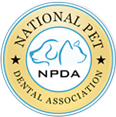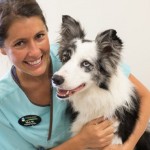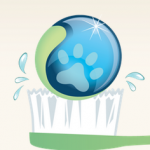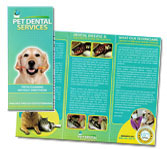“The services provided by Pet Dental Services have proven to be invaluable to our practice. Our clients appreciate the safety and convenience that non-anesthetic dentistry provides to their pets. Pet Dental Service’s staff is incredibly kind and patient with the pets in their care. Even some of our fearful patients are able to benefit from a full dental cleaning due to the gentle care provided by the PDS staff.”
National Pet Dental Association
Did you know that your pets’ oral health is much like your own? Would you go months without brushing or years without visiting the dentist? According to the American Veterinary Medical Association (AVMA), 80% of dogs and 70% of cats have some form of dental disease by age 3, this is a huge number! The number one reason dental disease goes untreated is that in most cases, there are few signs or symptoms until very late in the disease process. Untreated dental disease can lead to many devastating issues such as severe bones loss, loose teeth, painful and swollen gums, problems eating, and of course bad breath! Also, recent studies show a correlation between oral disease and diseases that can affect your pet’s vital organs, including the heart, liver and kidneys.
The National Pet Dental Association (NPDA) was created to help educate pet owners on the importance of proper dental care and the different options of dental treatment that are available. Previously, it was not unusual to wait until a pet had symptoms of severe dental disease already present before care was provided. At that point, it was common for the pet to need teeth extractions and more involved treatment. Throughout the years, veterinary dentistry has progressed to give owners more options to combat dental disease. This is an exciting time in veterinary medicine because the link between oral health and overall patient health is so connected.
The most important thing to consider when seeking dental treatment for your pet is that a professional dental cleaning is a medical procedure, so it must be performed under the direct supervision of a licensed veterinarian. Second, depending on the condition of your pet’s oral health, you have options as to what type of cleaning is best suited for your pet, whether it be a traditional anesthetic dental, or a dental cleaning without anesthesia. The first step is to schedule an oral exam for your pet with your veterinarian this way they can determine the best treatment plan for your pet. Anesthetic dentals are necessary when your pet is showing signs of advanced dental disease. Full mouth x-rays can be conducted while you pet is under anesthesia, dental x-rays are important so they can expose potential disease under the gum line. For less advanced cases non-anesthetic dental cleanings can be done. A non-anesthetic dental procedure is a dental cleaning completed without anesthesia on pets that do not have significant dental disease. The non-anesthetic approach is a great preventative cleaning and it is conducted by utilizing behavioral management and proprietary holds to ensure the pet’s safety throughout the dental procedure. There are also instances where the veterinarian may not want to anesthetize a pet due to a medical condition, and they will then suggest a non-anesthetic dental cleaning.
Understanding “who” will be cleaning your pet’s teeth is a key factor in seeking proper dental treatment. There are many places, mainly grooming shops and pet stores, that claim to perform a dental cleaning. While it is okay for them to brush your pet’s teeth, a dental cleaning is a medical procedure. The risk of having your pet’s teeth cleaned by an uneducated layperson, with little or no formal training, outside of a veterinary hospital, could be hazardous and even fatal for your pet. Actually, it is even considered illegal in many states. You wouldn’t go to your barber or hairdresser to get your teeth cleaned, would you? Then you should not take your pets to a groomer or pet store to have their teeth cleaned.
Professional dental cleanings should be performed annually – semiannually depending on your pets individual needs and your veterinarian’s recommendations. Also dental home care can help reduce bacteria build up in between professional dental cleanings. There are so many wonderful dental products on the market for pets. Keep in mind that human dental products should never be used on pets due to the high levels of xylitol and fluoride that may be toxic for your pet if ingested. For more pet safety advice visit www.NPDA.info.
Remember pets are unable to verbalize painful oral disease so regular dental cleanings and oral exams are so important in keeping our pets happy and healthy!
For more information and to find a professional service provider for your pets dental care needs, please visit or call the National Pet Dental Association, www.npda.info or 1.866.561.6717.

 Dr. Melissa Byers
Lake Forest Animal Clinic
Lake Forest, CA
Dr. Melissa Byers
Lake Forest Animal Clinic
Lake Forest, CA







